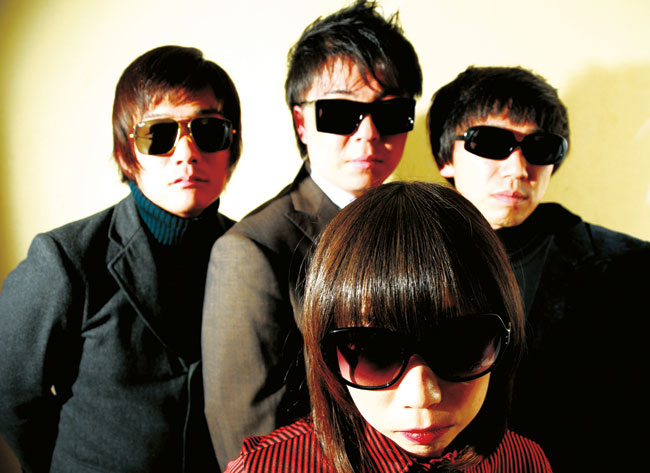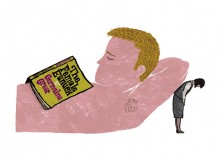
March 18, 2010
Molice
The Tokyo indie rockers thrill audiences from London to Vietnam.
By Metropolis
Originally published on metropolis.co.jp on March 2010

Some bands get all the luck. Within just two short years, Tokyo four-piece Molice have played Japan’s huge Summer Sonic festival and toured Britain, recorded two albums and been touted by Time Out as one to watch in 2010. And if that weren’t lucky enough, they’re also excellent. The jammy bastards.
Taking in the angular riffs of the Pixies, the dancefloor grooves of CSS, the odd Johnny Marr guitar flourish, dry female vocals and little pinches of shoegaze, rockabilly and soul, Molice’s sound is at once complex yet spare. Their new album, Catalystrock, is darkly thrilling.
“When people ask us who our influences are, we usually say The Doors, Pixies and The Police,” explains singer, guitarist and chief songwriter Rinko as she sips a blueberry yogurt drink in a cavernous Shinjuku cafe. “But of course, we listen to a lot of other music, too, and we’re not really sure which songs have an effect on our music. So while this album may sound a bit Pixies-ish, the next album might be 100 percent Doors!”
She’s probably joking, though with Molice, it’s never easy to be sure. Still, Rinko is the band’s visionary core, writing almost all the music (right down to the rhythm patterns and basslines) as well as creating the band’s artwork. “Everything arrives fully formed in my head, and I have to ask the others nicely to play the songs as I’ve imagined them,” she deadpans.
Molice produce all their music themselves, with guitarist Yuzuru Takeda taking the lead. “We took all our recording gear and set up in a regular rehearsal room, not a recording studio,” he explains of the making of Catalystrock, speaking in a warm tone with a slight stammer. “We feel more comfortable recording in the same place we rehearse.”
Rinko and Takeda created Molice (“Mo” as in Jim Morrison and “olice” as in The Police) in 2007 after their former band, China Chop, hit the rocks. They met bassist Ikuhiro and drummer Koyama Takashi at Rubber Soul, a tiny ’60s-themed bar in Kokubunji, and began playing shows there every week. Six months later, without having even performed in a regular live house, they won an audition and found themselves on the vast Island Stage at Summer Sonic. “After that, we had nothing left to fear,” says Rinko.
Molice’s first album, Doctor Ray, was released independently to a warm reception in 2008. Standout track “Headphone” was a dancefloor killer, although as an indie release it didn’t grace the sound systems of too many clubs. Nevertheless, the eclectic album began to generate a buzz among the underground.
Catalystrock is a more focused record, with great care taken over polishing the lyrics and heightening the tension. Like much of the band’s inner workings, this was all deliberate: under Rinko’s lead (“I become a devil woman before a deadline,” she says), Molice think hard about their place in the music world.
“I hope Metropolis’ readers can become more familiar with Japan’s independent music scene,” says Takeda. “I have American friends who tried to watch Space Shower TV, and of course it made them think Japanese music was awful. But when they went to live houses and saw some real bands, they realized that there’s loads of great music in Japan.”
Molice played three shows in London in December, and this, too, was a calculated step—from the very start, the group had agreed they would one day play abroad. Perhaps the weekend after Christmas wasn’t the best time to do it, but Rinko says they learned valuable lessons from their first Western foray.
We don’t think only about Japan; we think about the planet Earth,” she says. “We want to play wherever there are human beings. So playing abroad felt very natural.
“Also, live houses in Japan are nearly always in the basement, but in England it’s usually on the ground floor. You can hear the music from outside. That felt like a whole new world to me.”
“We arrived in London on Christmas Day, and the streets were totally deserted,” adds Takeda. “Then the next day the sales started, and suddenly there were people everywhere!”
“We tried to go to the British Museum, but because it was Christmas, it was closed,” laughs Rinko. “But the souvenir shop was open, so I bought a very sad little souvenir.”
Molice next head to Vietnam, where they will play Hanoi’s CAMA Festival in May alongside bands from around Asia, the US, Canada and New Zealand. “I can’t even imagine what it will be like,” says Takeda.
Who knows: perhaps they’ll find their perfect buddy band in Hanoi. After all, you can’t plan for everything.
Molice
Japanese indie rock quartet celebrate the release of their new CD. Mar 26, 6:30pm, ¥2,500 (adv)/¥3,000 (door). Rock Joint GB, Kichijoji. Tel: 0422-23-3091.
Catalystrock is available on Velour Voice.







